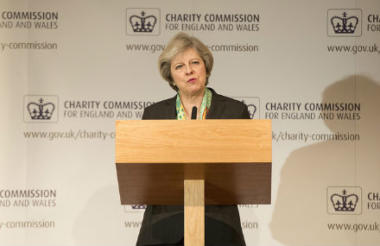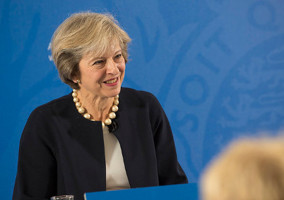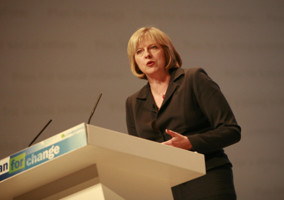Prime Minister Theresa May has said that a key part of her "shared society" vision for the UK involves “creating an environment in which our charities and social enterprises can thrive”.
In a wide-ranging speech at the Charity Commission’s annual public meeting yesterday to unveil her social reform agenda the Prime Minister said her vision "means creating an environment in which our charities and social enterprises can thrive – but responding when a small minority pursue inappropriate and unacceptable fundraising practices.
“And it means not being ambivalent about the efforts of all those who give their time, money and expertise in the service of others; but recognising, supporting and championing those who lead the way in shaping a civil society that can bring the talents of so many in our voluntary sector to bear on some of the great social challenges that we face together.”
May said her government would continue to support initiatives such as National Citizen Service, the Points of Light awards to recognise volunteers and supporting the #iwill campaign which was a central part of David Cameron’s big society agenda.
She also said that social finance would continue to be part of the government’s agenda.
“We will continue to lead the way internationally in the development of social finance to harness the full potential of our charities and social enterprises in working with business and government to tackle some of the biggest social challenges in our country,” she said.
Role for Mind chief executive
A key part of May’s shared society programme is a stronger focus on mental health issues.
As part of this she has asked Paul Farmer, chief executive of Mind and chair of Acevo, to work alongside Lord Stevenson, a mental health campaigner, to “work with leading employers and mental health groups to create a new partnership with industry, and make prevention and breaking the stigma top priorities for employers”.
She praised the work charities had done to raise awareness of mental health issues.
May also announced £15m of new funding for “community clinics, crisis cafes, and alternative places of safety to support a wider range of preventative services in the community, and ensure that charities, churches and community organisations can access funding to run them too”.
‘Good progress on Charity Commission reforms’
May said the charity sector was an example of “a country built on the bonds of family, community and citizenship” and said maintaining trust in the sector was key.
She then praised the progress that the Charity Commission has made to reform itself.
She said: “The work that William, Paula and their team at the Charity Commission are doing is so important. Because the reforms they are leading are strengthening the sector – and together with the new Fundraising Regulator – ensuring public confidence in our charities and the contribution they make in helping to meet some of the greatest social challenges of our time.”
Reaction
Charity sector leaders were broadly positive about the speech, but said it was important that the rhetoric fed through into policy initiatives.
NCVO: ‘we have skills to make it happen’
Sir Stuart Etherington, chief executive of NCVO, said “I was very pleased to hear the Prime Minister’s speech today. She is entirely correct that the state alone cannot solve problems, and that different types of organisations share the responsibility for improving our society, but also that between us we have the skills to make it happen.
“Charities and volunteering are at the heart of our shared society.”
He said he was pleased that May had committed to initiatives like NCS and added: “Volunteering is the clearest expression of the will of millions of people to take an active role in society, and we should take every opportunity to reinforce its value.”
CAF: ‘charities have a crucial role to play’
John Low, chief executive of the Charities Aid Foundation, said: “Charities are at the centre of what makes Britain great, and must be at the heart of its future. At this critical moment in our country’s history, charities have a crucial role to play in developing a better society at home and securing Britain’s new place on the global stage.
“Mrs May rightly recognises the need for our charities and social enterprises to thrive. Her shared society must be more than a shift in the way government makes policy; it must mean working in tandem with Britain’s charities at home and abroad to share and strengthen our values, unite our communities and give people a voice.”
Acevo: ‘voluntary sector is ready to deliver’
Asheem Singh, interim chief executive at Acevo said: “A shared society is a good placeholder but it needs a practical undercarriage. The voluntary sector, led by Acevo members, are ready to help deliver this vision and we are clear about what we need to do that: better commissioning with fairer procurement procedures both nationally and locally; a regulator that represents and is reflective of the sector’s experience and diversity with an accompanying reduction, not proliferation, of red tape; high quality development funding; a commitment from the government to focus five per cent of spending in key departments on preventative services.”
SEUK: ‘social enterprises should be included in industrial strategy’
Peter Holbrook, chief executive of Social Enterprise UK, said: “We stand ready to help the government create an environment in which charities and social enterprises can thrive.
“There is some way to go. Currently too many social enterprises are succeeding despite rather than because of the economic, taxation, and policy environments they operate in. They need a government which helps them help the most vulnerable as well as those just managing: including social enterprise in the Industrial Strategy would be a good start.
“Nevertheless, it is refreshing to hear the Prime Minister reiterate her intention to lead a government which is active and which rejects a laissez-faire approach to social issues. As ever, the devil will be in the detail and the delivery, and we know that many social enterprises are ready and able to put these words into action.”
Charity Commission: ‘announcement indicates importance of sector’
William Shawcross, chair of the Charity Commission, said: "I was very proud to welcome the Prime Minister as our guest and honoured that she chose the Charity Commission’s public meeting to give such a significant speech. There could be no better indication of the importance of charities to this country, and of our responsibility as regulator.”










